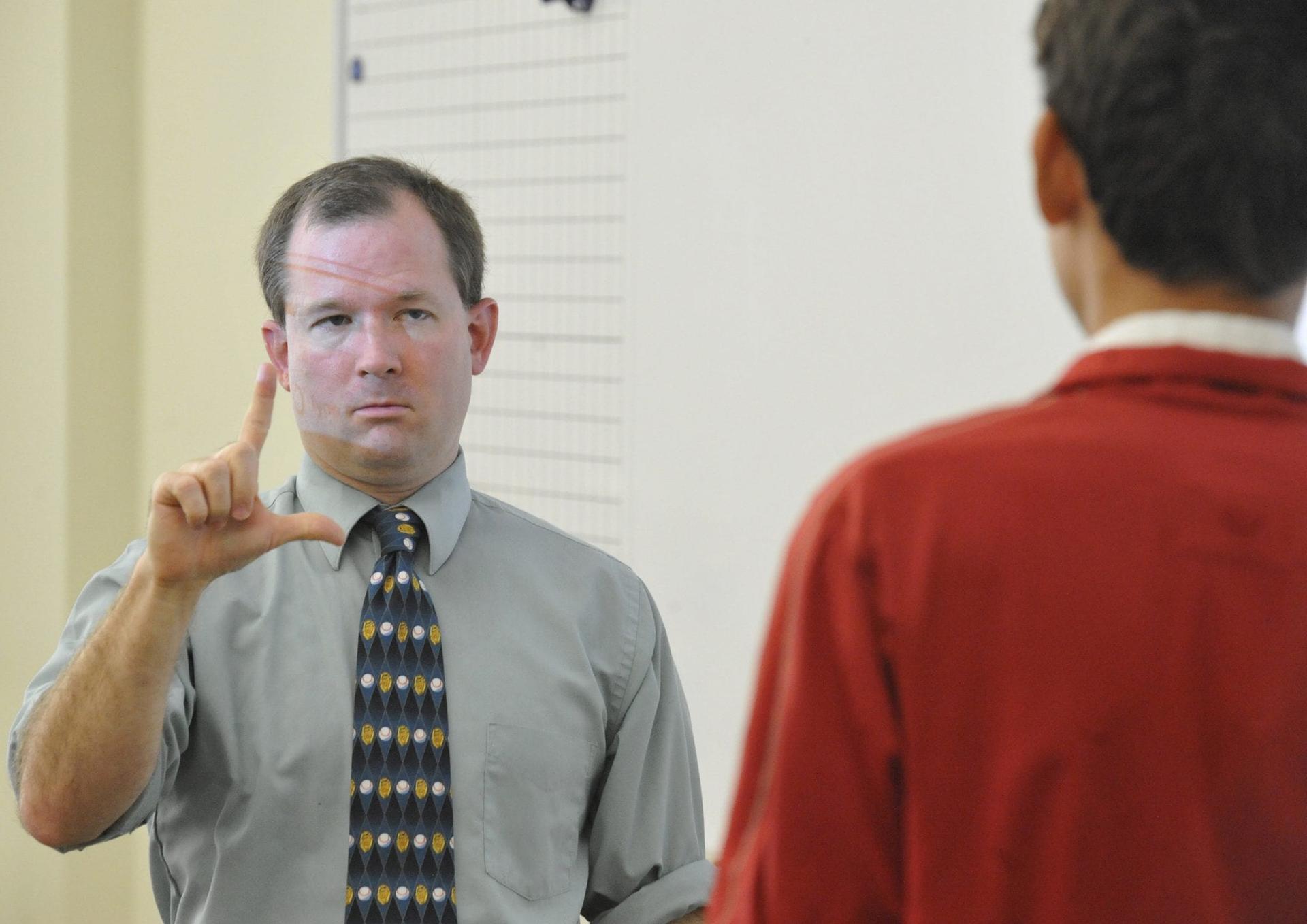NEW ORLEANS — One of the hallmarks of a Catholic school is what you don’t hear.
More than a thousand students might be packed inside classrooms during the school day, but the sound of silence in the hallways is an unmistakable sign that education is in progress.
American Sign Language (ASL) — an elective class for seniors at Brother Martin High School in New Orleans — has taken that silence to the monastic level, adopting a religious community’s approach to silence soon after the school year began.
On the first two days of school, American Sign Language teachers Patrick McClain and Andrew Nicola presented a verbal outline for the one-semester, half-credit course, allowing the eight seniors to ask questions in class.
But since then, there has been nothing but silence as students learn the facial expressions, eye, lip and hand movements and body postures that are the nouns, verbs and adjectives of ASL. Any questions or answers that can’t be “signed” are written out by students using magic markers on their personal, white eraser boards they keep at their desks.
“It’s the only class that’s been this quiet,” senior Zach Gonsoulin told the Clarion Herald, archdiocesan newspaper of New Orleans.
Or, as Debbie Broussard, Brother Martin’s assistant principal for academics who launched the elective this year, says jokingly: “We don’t have any discipline issues in this class. It’s a very motivating class that’s quite silent.”
The seed for the class was planted by Jenice Heck, whose son Andrew is a freshman at Brother Martin. Heck, who is blind, is vice president of vision rehabilitation services for Lighthouse Louisiana, formerly known as Lighthouse for the Blind.
“Lighthouse Louisiana is known for serving blind people for over 100 years, but we also serve people who are deaf or hard of hearing as well,” Heck said. “Our mission is to empower people with all types of disabilities.”
When Heck’s son was an eighth grader at Brother Martin, she thought ASL would be a great addition to the school’s array of senior electives, and she pitched the idea to Broussard, who leads the academic council at Brother Martin. Heck told Broussard of the significant shortage of ASL interpreters in Louisiana.
“(Broussard) was rattling off the multitude of electives that were going to be coming this year, and one she mentioned was sign language,” McClain said. “I thought, ‘Whoa, whoa, what can I do to teach that course?'”
During discussions with faculty, McClain, a calculus teacher, mentioned the role ASL had played in his life. As a student at Catholic High in Baton Rouge, he was a counselor for several years at the summer Louisiana Lions Camp, which included a two-week session for children who were deaf or hard of hearing.
McClain honed his ASL skills after college while teaching at Catholic High. One of his co-workers suggested McClain join him in taking ASL night classes at the Louisiana School for the Deaf.
McClain and his wife have two children, but they had no idea when McClain took the ASL classes in Baton Rouge several years ago that their future son, who is now 2 years old, would be hard of hearing.
“That kind of reinvigorated me to want to go back and brush up on the signing that I had learned almost 10 years ago but hadn’t done much with,” McClain said.
Nicola, Brother Martin’s head wrestling coach, had taken four semesters of ASL at Indiana University.
McClain and Nicola pulled off a slight surprise on Day 1 when they told the students the cone of silence would be lowered on Day 3.
“I think that caught them a little off guard,” McClain said. “When I took my classes at the Louisiana School for the Deaf, all of my teachers were themselves deaf. Andrew’s first (ASL) teacher (in college) was hearing, and every teacher he had after that was deaf. I think our students are having a good time. In this class, the students have said that they always have to be looking at what’s going on.”
Senior Cade Dupuis said he was in kindergarten when his parents first noticed that he might have a hearing problem. Audiologists confirmed he was deaf in his right ear, and in 2009, Dupuis had a cochlear implant.
“It was a huge difference,” Dupuis said. “I could hear the ice cream truck coming down the street.”
Before taking the ASL elective, Dupuis said he had no experience with sign language.
“I think it’s a great opportunity for the school because more people need to learn ASL,” Dupuis said. “It relies on a lot of participation, and you have to pay attention. Everyone groups together to help you if you don’t understand a sign.”
McClain says the biggest challenge to learning ASL is understanding facial expressions.
Heck, who brought the idea to Brother Martin, said she is delighted how the course has taken hold with the students and hopes it will spread to other schools.
“I get goosebumps,” Heck said. “I’m so excited and proud of Brother Martin and the fact that my son goes there. Hopefully, by the time he’s a senior, it will actually be a full-credit course. But it’s good to start small and see how much interest there is. This has great potential. We want to bring this to other schools.”
– – –
Finney is executive editor/general manager of the Clarion Herald, newspaper of the Archdiocese of New Orleans.
Crux is dedicated to smart, wired and independent reporting on the Vatican and worldwide Catholic Church. That kind of reporting doesn’t come cheap, and we need your support. You can help Crux by giving a small amount monthly, or with a onetime gift. Please remember, Crux is a for-profit organization, so contributions are not tax-deductible.












